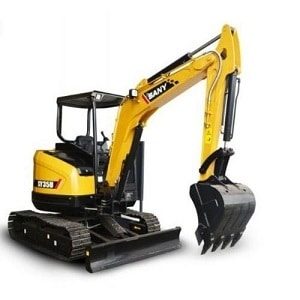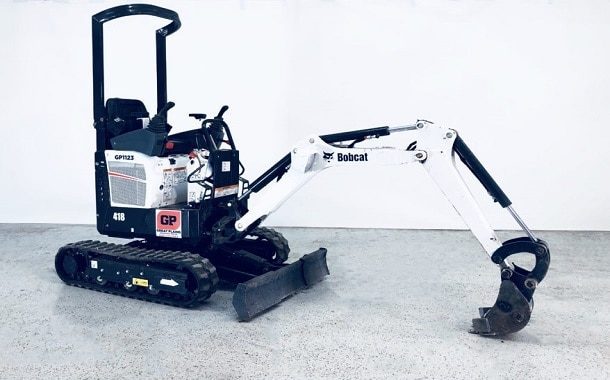How Much Does a Mini Excavator Cost?
Last Updated on March 2, 2024
Written by CPA Alec Pow | Content Reviewed by ![]() CFA Alexander Popinker
CFA Alexander Popinker
Mini excavators, also known as compact excavators, are versatile pieces of construction equipment used for digging trenches, landscaping, utility work, and various earthmoving tasks.
Their small size and maneuverability allow them to access confined spaces and work efficiently on small to medium-sized projects. When considering adding a mini excavator to your fleet, it’s important to understand all the associated costs.
This guide provides a comprehensive overview of the important factors that determine mini excavator costs.
We’ll look at purchase prices, rental rates, operating expenses, maintenance costs, and other financial considerations that impact the total cost of owning and operating a mini excavator.
Whether you’re a contractor looking to invest in equipment or a homeowner planning a DIY landscaping project, this guide will help you make an informed decision based on your budget and needs. Learning about mini excavator costs upfront will help maximize your investment and productivity on the job site.
How Much Does a Mini Excavator Cost?
The costs associated with acquiring and operating a mini excavator can be grouped into three main categories:
- Purchase Price – This includes the upfront price to buy a new or used mini excavator. Prices typically range from $15,000 to $100,000.
- Rental Fees – If renting a mini excavator, daily, weekly, and monthly rates apply. Rental rates generally range from $200 to $500 per day.
- Operational Expenses – These include fuel, maintenance, repairs, insurance, registration fees, and other costs incurred through use of the equipment. Operational costs can range from $10 to $30 per hour.
Lyroad mentions that mini excavator prices vary from $5,000 to $94,900 or more, subject to brand, size, configuration, and attachment.
HIXENexcavator.com states that new mini excavators can be purchased for anywhere from $20,100 to $90,200, with a mid-range price point of approximately $29,700 to $48,700.
Quipli reports that brand-new mini-excavators start at around $75,000, while used models can cost around $50,000 or less.
Rental vs. Purchase
The first decision is whether to purchase a mini excavator or rent one. Here’s an overview of the trade-offs:
Rental Rates vs Purchase Prices
For short-term or intermittent projects, renting is likely the more affordable option. Rental rates allow you to pay for only the time you need the mini excavator. Renting also transfers repair and maintenance responsibilities to the rental company.
For frequent, long-term use, buying a mini excavator can provide cost savings compared to accumulating many months of rent payments. However, the higher upfront investment means taking on all risks and responsibilities for the equipment.
Deciding Between Renting and Buying
Consider how often you will use the mini excavator and the time span of your projects. If you only require a mini excavator occasionally, like a few days per month or for a single project, renting is the best option.
If you routinely need a mini excavator for projects week after week, and for years into the future, purchasing one is likely the more economical choice. But also consider whether you can fully utilize and generate income with the mini excavator year-round.
Purchase Price
If buying a mini excavator, the starting point is the purchase price. Here are key factors affecting price:
- New vs. Used – A new mini excavator will cost $15,000 to $75,000 depending on size and features. A used, older model mini excavator can cost 50-80% less, in the $10,000 to $40,000 range.
- Size/Operating Weight – The heavier the excavator, the higher the price. Mini-excavators weigh 1 to 10 tons. Generally, smaller 3-5 ton models cost $15,000 to $45,000, while larger 8-10 ton models run $45,000 to $100,000.
- Brand – Major brands like Caterpillar, John Deere, and Kubota command higher prices based on reputation and product quality. Expect to pay 10-20% more than lesser-known brands.
- Features – Options like climate control, auxiliary hydraulics, coupler kits, etc. add to the purchase price. Limiting features can save 5-15% off list prices.
When buying used, also factor in hours of use, condition, and maintenance records to accurately value the mini excavator. Overall, purchase prices cover a wide range depending on these variables.
Also read about the cost of a semi truck, a backhoe, and to rent a Menards truck.
Operating and Ownership Costs
Beyond the purchase price, inspect the operating costs that will recur over the mini excavator’s lifetime. This includes:
Maintenance and Repairs
Regular maintenance like oil changes, inspections, and periodic component replacements are essential for proper functioning and longevity. This can cost $500 to $5,000 per year. Major repairs for engine or hydraulic issues can cost $2,000 to $10,000+.
Fuel
Fuel to run the diesel engine is a significant ongoing cost. Fuel consumption ranges from 2 to 8 gallons per hour. At diesel prices of $3 to $5 per gallon, plan on $6 to $40 per hour in fuel costs.
Insurance
Liability and damage coverage typically costs $500 to $5,000 annually, based on machine value, coverage levels, and risk factors.
Registration/Licensing
Local governments may require special licenses or registration for equipment operation, costing $50 to $500 annually.
Financing
If financing the purchase, interest payments add 10-30% on top of the mini excavator price over the loan repayment period.
Calculate estimated hourly operating costs to determine if you can profitably utilize the equipment. Target operational costs between $15 and $50 per hour to maximize returns.
Maximizing Your Investment
 Here are final tips to choose the right mini excavator and maximize value from your investment:
Here are final tips to choose the right mini excavator and maximize value from your investment:
- Select a model correctly sized for your typical projects, with required features, but avoid overbuying on size or options you won’t use.
- Perform preventative maintenance to avoid major repairs and lengthen usable lifetime.
- Compare financing rates to find the best terms. Consider dealer promotions.
- Use telematics data to optimize utilization and minimize fuel costs.
- Join equipment associations for access to insurance programs and volume discounts on parts/service.
- Consider resale value – larger brand name models tend to retain greater residual value.
Taking time upfront to understand all cost factors will help ensure you get the maximum return on investment from your mini excavator purchase or rental.
Final Words
This guide provided a detailed overview of the key factors impacting mini excavator costs. To recap, consider purchase price, rental rates, operating costs, brand and model comparisons, and your projected utilization. Evaluating these cost factors against your budget and workload will enable choosing the most affordable mini excavator option.
Be sure to get quotes directly from equipment dealers and rental companies. And don’t forget to account for transportation, fuel, maintenance, insurance, and other ownership costs beyond just the sticker price.
With research and planning, a mini excavator can be an excellent addition to your equipment fleet and a wise investment in productivity for all types of construction and landscaping jobs.
Is buying a mini excavator a good investment?
Buying a mini excavator can be a good investment if you will use it consistently over many years to complete projects efficiently and profitably. The key factors are utilizing it enough annually to justify the large purchase price and associated ownership costs, instead of overpaying for capacity that goes unused.
For frequent excavation needs, buying your own mini excavator provides convenience and cost control compared to renting.
How much money can you make with a mini excavator?
The earning potential with a mini excavator depends significantly on your utilization rate and job scope. Most mini excavators rent for $200 to $500 per day. After deducting operating costs of $100 to $200 for fuel, maintenance, etc., that leaves potential profits of $100 to $400 per day of rental use.
For owned machines, contractors typically target billing clients 2 to 3 times their hourly operating costs. At hourly operating costs of $20 to $40, contractors can make $40 to $120 per hour running their own mini excavator.
With efficient use, contractors report generating $2,500 to $10,000 per month in mini excavator revenue. Maximizing uptime on profitable projects is key to making a mini excavator a worthwhile earnings generator.
What is the life expectancy of a mini excavator?
With proper maintenance and limited wear and tear, most mini excavators can last 8,000 to 12,000 engine hours, although longevity varies by brand and model.
Assuming consistent annual use of 1000 hours, you can reasonably expect 8 to 12 years of usable life from a mini excavator before major repairs start outweighing equipment value.
Usage hours, preventative maintenance, and operator care are the biggest factors determining the productive working life span. Replacing wear parts as needed will allow you to maximize the hour meter before component failures trigger escalating repair bills.


Leave a Reply
Want to join the discussion?Feel free to contribute!